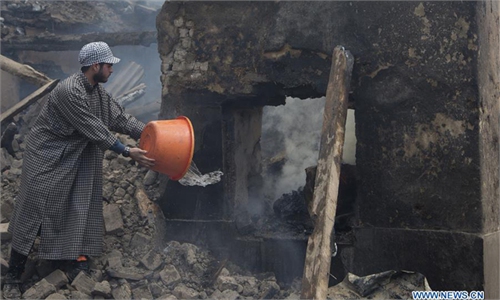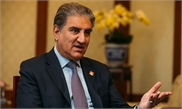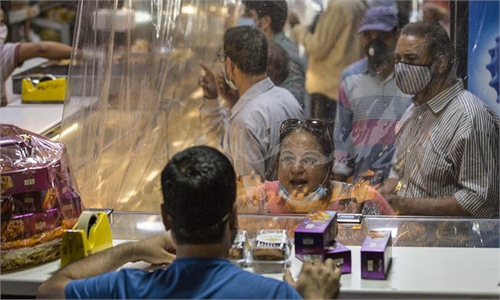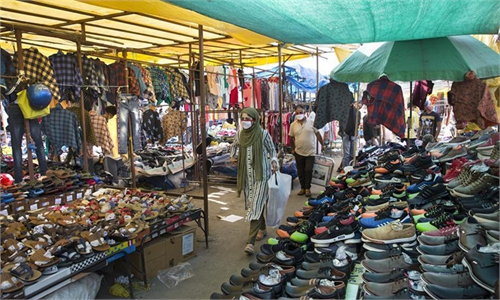IN-DEPTH / DIPLOMATIC CHANNEL
Growing international condemnation would dissuade India from illegal acts: Ambassador of Pakistan to China
Editor's Note:
The Global Times reporter Dong Feng (GT) recently had an interview with Moin ul Haque (Haque), Ambassador of Pakistan to China, over the Kashmiri people's livelihood in the perspective of human rights, the latest progress in the China-Pakistan Economic Corridor (CPEC) and Pakistan's further engagement in the Shanghai Cooperation Organization (SCO) Youth Council's activities.
GT: Pakistan called for global monitoring of human rights abuses in Indian-occupied Jammu and Kashmir (IOJK) on July 16. What are your deep concerns about the situation in IOJK.
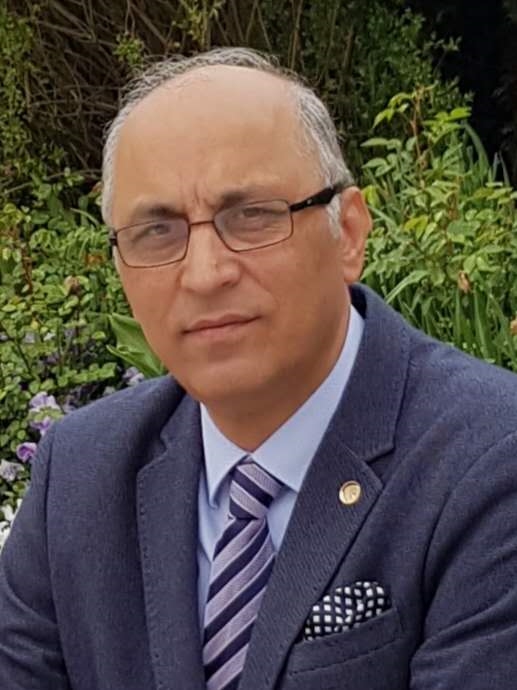
India's ban on media reporting and denial of access to independent observers smacks of its nefarious designs. India's flagrant disregard of international norms is shocking and simply unacceptable. The continued abysmal state of human rights situation in IIOJK in this 21st Century raises serious questions about India's claim to be a secular, tolerant and pluralistic society.
GT: What is your evaluation on the importance of taking urgent steps by the international community to help address the grave situation?
Haque: The past seven decades of India's illegal occupation of Jammu and Kashmir is replete with brutal repression, pseudo-legislative shenanigans and an utter and unilateral disregard for all norms of civilized state behavior. The illegal action of August 2019 kick-started another wave of measures to further militarize the region, terrorize the population and enforce a demographic apartheid with the ultimate objective to disenfranchise and subjugate the people of Kashmir.
In the immediate term, it is imperative for the international community to realize that by turning a blind eye to the illegal occupation and not listening to the voice of the Kashmiri people will only engender further misery and humanitarian tragedy. The persecution of Kashmiri people and minorities elsewhere in India is a direct result of the BJP [Bharatiya Janata Party] government's RSS [Rashtriya Swayamsevak Sangh]-inspired extremist Hindutva mindset, which stands exposed before the international community for its crimes against humanity. As the military siege of Kashmir continues and becomes ever more apparent and increasingly well documented, the world can no longer ignore it. Before it becomes a blot on their conscience, the international community should call for a peaceful resolution as per UN Security Council resolutions.
Throughout this tragic yet heroic epic of the Kashmiri people, the principled position and support of the government and people of China is a rare bright spot. China's articulate advocacy of resolving this dispute - the oldest unfinished agenda of the UN Security Council - is a clarion call for the world to look past narrow self interests. The urgency and importance of the dire situation require major powers to urge India to reverse its illegal actions of August 5, lift the siege, restore their fundamental rights and honor the promises made to the Kashmiri people by the Indian leadership.
GT: What are the specific data/facts regarding India's consistent pattern of arbitrary arrests, detentions, torture, corporal punishment, extra-judicial killings, and physical and digital lockdown in occupied Kashmir?
Haque: IIOJK is no stranger to Indian atrocities where killings, rape, torture, destruction of property are the tools of choice of the Indian occupation forces. Since past three decades, around 100,000 Kashmiris have been killed, more than 160,000 civilians illegally detained and more than 100,000 houses destroyed. Thousands of women have been raped and countless children orphaned. For this year alone, around 200 innocent Kashmiris have been killed, around 50 cases of rape and molestation and nearly 1,000 cases of destruction of houses and property have been reported. In addition to that nearly 2,200 civilians have been arrested.
The two reports published by the UN office of Human Rights have given details of these human rights violations committed with chronic impunity by the Indian Security Forces.
GT: While the international community is preoccupied with fighting the COVID-19 pandemic, India has been busy trying to illegally change the demographic structure of the occupied territory and intensifying its brutalization of the Kashmiri people with extra-judicial killings of Kashmiri youth in fake encounters and so-called anti-infiltration operations. What are the supportive data/facts to the Pakistani Foreign Office's statement in early-June?
Haque: Despite the draconian military siege in IIOJK and almost complete communications blackout, the scale and brutality of India's military repression in the territory cannot remain hidden in this day and age. In the first six months of 2020 alone, at least 300 innocent Kashmiris were killed by the occupying forces. The tragedy has been further compounded by the COVID-19 pandemic. It is the hallmark of totalitarian regimes to use public emergencies and crises to consolidate their hold, further obfuscate the truth and justify their resort to inhuman measures. India under the unholy BJP-RSS combine is no different. While governments over the world are focused on preserving the well-being of their peoples' health and livelihoods, India has used the pandemic to continue its repression and hateful policies.
The new domicile law for the IIOJK seeks to systematically change the demographic structure of the occupied territory. According to some estimates, 1.74 million Indians or 14 percent of the total Kashmiri population could acquire the Kashmiri domicile under the new law, thereby diluting the residency rights Kashmiris enjoyed for centuries.
GT: Pakistan on June 5 urged the international community, including the UN, to immediately recognize the gravity of the human rights situation in the disputed region and hold New Delhi accountable for its crimes against the innocent Kashmiri people. What are the main actions that are required? After two months, any progress so far?
Haque: First and foremost, the international community and the UN should ensure that India revokes its illegal actions taken on and after August 5, 2019. These actions have not only impacted the status quo of the disputed region, it has threatened regional peace and security. Pakistan expects the international community to play the role of honest broker in the dispute, and take concrete actions to ameliorate the sufferings of the Kashmiri people. It is also important for the UN Security Council to ensure implementation of its numerous resolutions on the status of Jammu and Kashmir; not to be swayed by India's influence, which now sits on the Council; assess the situation in its correct perspective, and pave way for holding of free and impartial plebiscite in Jammu and Kashmir.
GT: The world must play its role in preventing the situation from escalating further in South Asia. To play that role, what are the top three/five necessary actions?
Haque: As the first step, the military siege of IIOJK has to end immediately.
Secondly, the international observers, including from the UN and free media and health workers, must be allowed into the occupied territory to assess the humanitarian impact of last August's illegal action, especially as it has been aggravated by COVID-19.
Thirdly, India's nefarious efforts to alter the demographic structure of the illegally occupied territory must be stopped, as these are against international humanitarian law.
Fourthly, India should allow the UN Military Observers Group for India and Pakistan to perform its mandate unhindered so as to preserve the ceasefire along the Line of Control.
Finally, the dangerous and one-sided regional arms buildup and the accelerated accumulation of advanced weaponry by the bellicose and belligerent regime in Delhi must stop. It is only serving to destabilize South Asia and the world. Major arm supplying countries must reconsider their policies of siding with the fascist regime. Such appeasement policy could lead to devastating results of proportions seen not too long ago in the last century. We must not condemn the region - home to a quarter of the world's population - to a vicious and never-ending cycle of insecurity, instability and poverty. The world must open its eyes before it's too late.
GT: UN Secretary General Antonio Guterres on June 15 asked India to end torture, use of pellet guns against children in IOJK. Now, over one month after the UN's request, from Pakistan, have you observed any Indian action yet?
Haque: Pakistan appreciates UNSG's call to India to stop the human rights abuses. As the Secretary General of the UN, Guterres' voice is powerful with a moral authority. Since long, the indiscriminate use of "pellet guns" against innocent Kashmiris have remained a favorable instrument of state terror by the Indian forces. The international human rights organizations have documented in detail how thousands of people have lost their eyesight due to this weapon. We could only hope that the growing international condemnation would dissuade India's fascist religion-nationalist regime from their illegal acts. Nevertheless, Indian leaders must be held accountable for these excesses and crimes against humanity.
GT: What actions are Chinese and Pakistani enterprises taking for post COVID-19 economic recovery?
Haque: Pakistan-China economic engagement has continued apace with an eye on the post-pandemic situation. While unprecedented in its scale, the economic disruption caused by the COVID-19 pandemic would hopefully be transient. The key would be to balance between prevention-and-control of infection risks and orderly resumption of economic activity. China's encouraging economic indicators over the past several months is a clear example of success of such an approach.
Enterprises have a leading role to play in advancing our economic and commercial ties in the post-pandemic phase. As a first step, both countries' enterprises have exchanged information and best practices for minimizing cross-infection risks through the use of appropriate social-distancing measures and masks, gloves and other personal protective equipment (PPE). Both countries' airlines are continuing to resume commercial flight operations, which play a major part in normal business-to-business interaction and the movement of people and goods.
Chinese enterprises have also made generous donations of PPE and epidemic-prevention material and equipment to their partners and host communities and local government departments in Pakistan. Enterprises in the pharmaceutical sector have also stepped up their regular interactions, including the all-important area of vaccine development. Two of China's COVID-19 vaccine candidates are slated to commence clinical trials with Pakistani enterprises and government departments in the near term.
Even at the height of the outbreaks in China and Pakistan, every effort was made to minimize the impact of disruption on normal business and commercial exchanges between the two countries. As the situation normalizes, with China having successfully contained outbreaks and the pandemic's trajectory consistently declining in Pakistan, both sides are implementing a fast-track channel for smooth B2B interaction.
GT: The Prime Minister Azad Jammu and Kashmir Raja Farooq Haider and the CEOs of China Three Gorges and China Gezhouba separately held meetings with Chairman CPEC Authority Lt. General Asim Saleem Bajwa in Islamabad to thank the CPEC Authority for helping realize the Kohala and Azad Pattan hydropower projects and further coordination their implementation; $4 billion investment, 1800 MW cheaper hydel power with 8,000 jobs. Please introduce the latest progress in CPEC?
Haque: Progress on these two major hydropower projects is a very encouraging development and part of our joint efforts to enhance Pakistan's energy mix and water-resources management. It also demonstrates that CPEC, as the flagship project of the visionary Belt and Road Initiative (BRI), is continuing to forge ahead despite efforts of our adversaries and challenges posed by the COVID-19 pandemic.
Guided by the consensus and vision of our leaders, CPEC has entered a new phase of development and engagement. The focus is now on industrial development, agricultural modernization, socioeconomic development and livelihood improvement. In mid-July 2020, [Pakistan] Prime Minister Imran Khan attended the groundbreaking of the Quaid-e-Azam Business Park, one of several special economic zones and industrial parks being developed across all parts of Pakistan with active investment and technical support from China. Together with the infrastructure development of CPEC's early-harvest phase, these initiatives would leverage Pakistan's traditional and competitive strengths in areas such as agriculture, textiles and logistics. Our youth and skilled labor force would benefit creating drivers for sustained economic growth and realizing the aspirations of our people for prosperity and stability.
GT: Special Assistant to the Prime Minister on Youth Affairs Usman Dar took part in the SCO Youth Council's meeting in 2019 as an observer on behalf of Pakistan, and in 2020 Pakistan has become the newest member of the Council. Please share the country's overarching plans to participate in SCO Youth Council's activities.
Haque: Pakistan joined the SCO in 2017 following the Heads of State Council summit in Nursultan, Kazakhstan. Throughout the long course of our engagement with the SCO, we have always attached great importance to the organization's potential to contribute to regional peace and security and win-win cooperation amongst member countries.
As home to one of the world's largest youth populations, Pakistan looks forward to strengthening people-to-people exchanges with other countries. The SCO Youth Council has an important role to play in fostering greater mutual understanding and learning between our young people, providing opportunities for constructive activities, and promoting a common perception of challenges and threats as well as the means to address them. We will continue to participate enthusiastically and encourage interactions of our youth at this forum.
The Global Times reporter Dong Feng (GT) recently had an interview with Moin ul Haque (Haque), Ambassador of Pakistan to China, over the Kashmiri people's livelihood in the perspective of human rights, the latest progress in the China-Pakistan Economic Corridor (CPEC) and Pakistan's further engagement in the Shanghai Cooperation Organization (SCO) Youth Council's activities.
GT: Pakistan called for global monitoring of human rights abuses in Indian-occupied Jammu and Kashmir (IOJK) on July 16. What are your deep concerns about the situation in IOJK.

Moin ul Haque, Ambassador of Pakistan to China Photo: Courtesy of the Embassy of Pakistan to China
Haque: The situation in Illegally Indian-occupied Jammu and Kashmir (IIOJK) has gone far beyond mere "deep concern." As we speak, the military siege of the Kashmiri people by the Indian police state has been ongoing for 365 days, with no end in sight. This siege includes a communications blackout, closure of educational institutions, bar on religious and public assembly, illegal and arbitrary detention of public figures, forced disappearances and extrajudicial killings of local youth. Local businesses are closed and economic activity on which the people's livelihood depends has come to a grinding halt. In recent times, such an inhumane lockdown has no precedence.India's ban on media reporting and denial of access to independent observers smacks of its nefarious designs. India's flagrant disregard of international norms is shocking and simply unacceptable. The continued abysmal state of human rights situation in IIOJK in this 21st Century raises serious questions about India's claim to be a secular, tolerant and pluralistic society.
GT: What is your evaluation on the importance of taking urgent steps by the international community to help address the grave situation?
Haque: The past seven decades of India's illegal occupation of Jammu and Kashmir is replete with brutal repression, pseudo-legislative shenanigans and an utter and unilateral disregard for all norms of civilized state behavior. The illegal action of August 2019 kick-started another wave of measures to further militarize the region, terrorize the population and enforce a demographic apartheid with the ultimate objective to disenfranchise and subjugate the people of Kashmir.
In the immediate term, it is imperative for the international community to realize that by turning a blind eye to the illegal occupation and not listening to the voice of the Kashmiri people will only engender further misery and humanitarian tragedy. The persecution of Kashmiri people and minorities elsewhere in India is a direct result of the BJP [Bharatiya Janata Party] government's RSS [Rashtriya Swayamsevak Sangh]-inspired extremist Hindutva mindset, which stands exposed before the international community for its crimes against humanity. As the military siege of Kashmir continues and becomes ever more apparent and increasingly well documented, the world can no longer ignore it. Before it becomes a blot on their conscience, the international community should call for a peaceful resolution as per UN Security Council resolutions.
Throughout this tragic yet heroic epic of the Kashmiri people, the principled position and support of the government and people of China is a rare bright spot. China's articulate advocacy of resolving this dispute - the oldest unfinished agenda of the UN Security Council - is a clarion call for the world to look past narrow self interests. The urgency and importance of the dire situation require major powers to urge India to reverse its illegal actions of August 5, lift the siege, restore their fundamental rights and honor the promises made to the Kashmiri people by the Indian leadership.
GT: What are the specific data/facts regarding India's consistent pattern of arbitrary arrests, detentions, torture, corporal punishment, extra-judicial killings, and physical and digital lockdown in occupied Kashmir?
Haque: IIOJK is no stranger to Indian atrocities where killings, rape, torture, destruction of property are the tools of choice of the Indian occupation forces. Since past three decades, around 100,000 Kashmiris have been killed, more than 160,000 civilians illegally detained and more than 100,000 houses destroyed. Thousands of women have been raped and countless children orphaned. For this year alone, around 200 innocent Kashmiris have been killed, around 50 cases of rape and molestation and nearly 1,000 cases of destruction of houses and property have been reported. In addition to that nearly 2,200 civilians have been arrested.
The two reports published by the UN office of Human Rights have given details of these human rights violations committed with chronic impunity by the Indian Security Forces.
GT: While the international community is preoccupied with fighting the COVID-19 pandemic, India has been busy trying to illegally change the demographic structure of the occupied territory and intensifying its brutalization of the Kashmiri people with extra-judicial killings of Kashmiri youth in fake encounters and so-called anti-infiltration operations. What are the supportive data/facts to the Pakistani Foreign Office's statement in early-June?
Haque: Despite the draconian military siege in IIOJK and almost complete communications blackout, the scale and brutality of India's military repression in the territory cannot remain hidden in this day and age. In the first six months of 2020 alone, at least 300 innocent Kashmiris were killed by the occupying forces. The tragedy has been further compounded by the COVID-19 pandemic. It is the hallmark of totalitarian regimes to use public emergencies and crises to consolidate their hold, further obfuscate the truth and justify their resort to inhuman measures. India under the unholy BJP-RSS combine is no different. While governments over the world are focused on preserving the well-being of their peoples' health and livelihoods, India has used the pandemic to continue its repression and hateful policies.
The new domicile law for the IIOJK seeks to systematically change the demographic structure of the occupied territory. According to some estimates, 1.74 million Indians or 14 percent of the total Kashmiri population could acquire the Kashmiri domicile under the new law, thereby diluting the residency rights Kashmiris enjoyed for centuries.
GT: Pakistan on June 5 urged the international community, including the UN, to immediately recognize the gravity of the human rights situation in the disputed region and hold New Delhi accountable for its crimes against the innocent Kashmiri people. What are the main actions that are required? After two months, any progress so far?
Haque: First and foremost, the international community and the UN should ensure that India revokes its illegal actions taken on and after August 5, 2019. These actions have not only impacted the status quo of the disputed region, it has threatened regional peace and security. Pakistan expects the international community to play the role of honest broker in the dispute, and take concrete actions to ameliorate the sufferings of the Kashmiri people. It is also important for the UN Security Council to ensure implementation of its numerous resolutions on the status of Jammu and Kashmir; not to be swayed by India's influence, which now sits on the Council; assess the situation in its correct perspective, and pave way for holding of free and impartial plebiscite in Jammu and Kashmir.
GT: The world must play its role in preventing the situation from escalating further in South Asia. To play that role, what are the top three/five necessary actions?
Haque: As the first step, the military siege of IIOJK has to end immediately.
Secondly, the international observers, including from the UN and free media and health workers, must be allowed into the occupied territory to assess the humanitarian impact of last August's illegal action, especially as it has been aggravated by COVID-19.
Thirdly, India's nefarious efforts to alter the demographic structure of the illegally occupied territory must be stopped, as these are against international humanitarian law.
Fourthly, India should allow the UN Military Observers Group for India and Pakistan to perform its mandate unhindered so as to preserve the ceasefire along the Line of Control.
Finally, the dangerous and one-sided regional arms buildup and the accelerated accumulation of advanced weaponry by the bellicose and belligerent regime in Delhi must stop. It is only serving to destabilize South Asia and the world. Major arm supplying countries must reconsider their policies of siding with the fascist regime. Such appeasement policy could lead to devastating results of proportions seen not too long ago in the last century. We must not condemn the region - home to a quarter of the world's population - to a vicious and never-ending cycle of insecurity, instability and poverty. The world must open its eyes before it's too late.
GT: UN Secretary General Antonio Guterres on June 15 asked India to end torture, use of pellet guns against children in IOJK. Now, over one month after the UN's request, from Pakistan, have you observed any Indian action yet?
Haque: Pakistan appreciates UNSG's call to India to stop the human rights abuses. As the Secretary General of the UN, Guterres' voice is powerful with a moral authority. Since long, the indiscriminate use of "pellet guns" against innocent Kashmiris have remained a favorable instrument of state terror by the Indian forces. The international human rights organizations have documented in detail how thousands of people have lost their eyesight due to this weapon. We could only hope that the growing international condemnation would dissuade India's fascist religion-nationalist regime from their illegal acts. Nevertheless, Indian leaders must be held accountable for these excesses and crimes against humanity.
GT: What actions are Chinese and Pakistani enterprises taking for post COVID-19 economic recovery?
Haque: Pakistan-China economic engagement has continued apace with an eye on the post-pandemic situation. While unprecedented in its scale, the economic disruption caused by the COVID-19 pandemic would hopefully be transient. The key would be to balance between prevention-and-control of infection risks and orderly resumption of economic activity. China's encouraging economic indicators over the past several months is a clear example of success of such an approach.
Enterprises have a leading role to play in advancing our economic and commercial ties in the post-pandemic phase. As a first step, both countries' enterprises have exchanged information and best practices for minimizing cross-infection risks through the use of appropriate social-distancing measures and masks, gloves and other personal protective equipment (PPE). Both countries' airlines are continuing to resume commercial flight operations, which play a major part in normal business-to-business interaction and the movement of people and goods.
Chinese enterprises have also made generous donations of PPE and epidemic-prevention material and equipment to their partners and host communities and local government departments in Pakistan. Enterprises in the pharmaceutical sector have also stepped up their regular interactions, including the all-important area of vaccine development. Two of China's COVID-19 vaccine candidates are slated to commence clinical trials with Pakistani enterprises and government departments in the near term.
Even at the height of the outbreaks in China and Pakistan, every effort was made to minimize the impact of disruption on normal business and commercial exchanges between the two countries. As the situation normalizes, with China having successfully contained outbreaks and the pandemic's trajectory consistently declining in Pakistan, both sides are implementing a fast-track channel for smooth B2B interaction.
GT: The Prime Minister Azad Jammu and Kashmir Raja Farooq Haider and the CEOs of China Three Gorges and China Gezhouba separately held meetings with Chairman CPEC Authority Lt. General Asim Saleem Bajwa in Islamabad to thank the CPEC Authority for helping realize the Kohala and Azad Pattan hydropower projects and further coordination their implementation; $4 billion investment, 1800 MW cheaper hydel power with 8,000 jobs. Please introduce the latest progress in CPEC?
Haque: Progress on these two major hydropower projects is a very encouraging development and part of our joint efforts to enhance Pakistan's energy mix and water-resources management. It also demonstrates that CPEC, as the flagship project of the visionary Belt and Road Initiative (BRI), is continuing to forge ahead despite efforts of our adversaries and challenges posed by the COVID-19 pandemic.
Guided by the consensus and vision of our leaders, CPEC has entered a new phase of development and engagement. The focus is now on industrial development, agricultural modernization, socioeconomic development and livelihood improvement. In mid-July 2020, [Pakistan] Prime Minister Imran Khan attended the groundbreaking of the Quaid-e-Azam Business Park, one of several special economic zones and industrial parks being developed across all parts of Pakistan with active investment and technical support from China. Together with the infrastructure development of CPEC's early-harvest phase, these initiatives would leverage Pakistan's traditional and competitive strengths in areas such as agriculture, textiles and logistics. Our youth and skilled labor force would benefit creating drivers for sustained economic growth and realizing the aspirations of our people for prosperity and stability.
GT: Special Assistant to the Prime Minister on Youth Affairs Usman Dar took part in the SCO Youth Council's meeting in 2019 as an observer on behalf of Pakistan, and in 2020 Pakistan has become the newest member of the Council. Please share the country's overarching plans to participate in SCO Youth Council's activities.
Haque: Pakistan joined the SCO in 2017 following the Heads of State Council summit in Nursultan, Kazakhstan. Throughout the long course of our engagement with the SCO, we have always attached great importance to the organization's potential to contribute to regional peace and security and win-win cooperation amongst member countries.
As home to one of the world's largest youth populations, Pakistan looks forward to strengthening people-to-people exchanges with other countries. The SCO Youth Council has an important role to play in fostering greater mutual understanding and learning between our young people, providing opportunities for constructive activities, and promoting a common perception of challenges and threats as well as the means to address them. We will continue to participate enthusiastically and encourage interactions of our youth at this forum.
